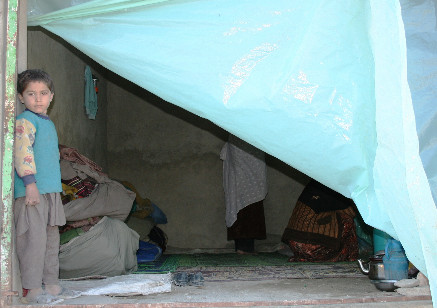Tens of thousands of the internally displaced persons (IDPs) in Afghanistan are vulnerable to cold-related diseases but have little or no access to health services, according to aid agencies.
Over 350,000 IDPs, including about 155,000 people displaced by conflict since November 2009, are living in camps and informal settlements in different parts of the country, the UN Refugee Agency (UNHCR) says.

Afghanistan is described as the “the most dangerous place to be born” given its notorious child mortality ratio (165 per 1,000 live birth), and pneumonia accounts for about 25 percent of the deaths, according to WHO. (Photo: Akmal Dawi/IRIN)
Aanchal Khurana, a spokeswoman for the UN World Health Organization (WHO), said: “WHO is concerned about the health problems that winter inadvertently brings for Afghans at large and to IDPs in particular.”
“IDPs’ needs are heightened in the winter as the lack of adequate shelter, food and jobs aggravate their already dire health conditions,” Lynn Yoshikawa, an official with US-based Refugees International told IRIN.
Pneumonia, measles, frost bite and acute respiratory infections (ARIs) peak during the country’s harsh winter, resulting in thousands of deaths every year, officials in the Ministry of Public Health (MoPH) said.
ARIs increased by over 20 percent in 2010 (480,000 cases) compared with 2009, Ghulam Sakhi Kargar, an MoPH spokesman, said.
Afghanistan is described as the “the most dangerous place to be born” given its notorious child mortality ratio (165 per 1,000 live birth), and pneumonia accounts for about 25 percent of the deaths, according to WHO.
“Fragile circumstances”
About three million Afghans will be exposed to very harsh weather conditions this winter, and one million people, mostly IDPs and returnees, have little or no access to essential health services, the UN Office for the Coordination of Humanitarian Affairs (OCHA) reported in a December 2010 Humanitarian Update.
“Afghanistan’s harsh winter, flash flood conditions and conflicts present great risks to poor families. Recently returned refugees and IDPs are among those groups living in particularly fragile circumstances,” said the Update.
In the southern provinces where insecurity and armed violence are widespread, at least 500,000 people have lost access to essential health services and over 100,000 children cannot be vaccinated, WHO said.
Some informal IDP settlements do not have formal health structures but MoPH said all citizens were entitled to the free-of-charge basic health services at state hospitals and clinics across the country.
However, insecurity, natural disasters and heavy snow impede access to health centres in some parts of the country.
NGOs, meanwhile, strive to meet the health needs of IDPs and other vulnerable communities which are not covered by MoPH’s basic health services. The International Medical Crops, for instance, delivers health services to over 150,000 IDPs and returnees at settlements/camps in the eastern Nangarhar, Laghman and Kunar provinces. Mobile health teams are also used in parts of the country where access becomes difficult in winter.
WHO said it had prepositioned “medical supplies in health facilities - either run by the state or through NGOs - ahead of each winter, especially in hard-to-reach areas that are often blocked off owing to harsh winter conditions”. These included pneumonia kits sufficient to treat 150,000 patients and other medicines to cover the health needs of almost 400,000 people for three months.
At least 16 outbreaks of seasonal diseases were confirmed and responded to by MoPH and partner NGOs over the past few months, of which 56 percent were measles; one H1N1 case was reported in the eastern province of Nangarhar, according to the OCHA Update.



